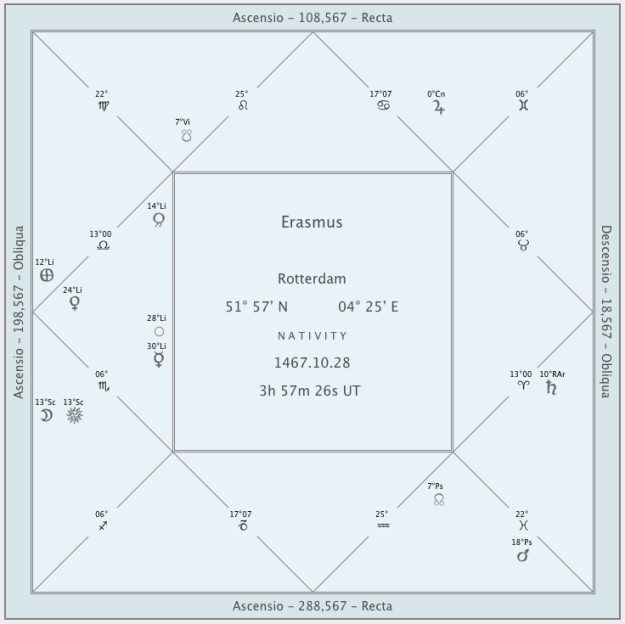
The highest form of bliss is living with a certain degree of folly. Erasmus
Recently I visit Rotterdam, homeland of the famous Renaissance humanist Erasmus. He was a scholar in latin and ancient greek and he prepared important new Latin and Greek editions of the New Testament. He is mostly remembered for his witty and satirical work ‘In Praise of Folly’.
Although Erasmus referred several times in his writings to his age, there is no certainty about the year of his birth since those references point in many different directions, ranging from 1464 to 1472 or even later. Anyway I have found in the book “Astrologia Naturalis” written in 1645 by David Origanus, German mathematician, astronomer and astrologer, the geniture of Erasmus Roterodamus.

Erasmus’ geniture from Astrologia Naturalis
Probably the time of birth that Origanus reports in his book is not very reliable, since he wrote two centuries after the Erasmus’ birth, anyway I think it can be interesting to give a look the the chart and with a bit of folly, as Erasmus suggests, we will find Origanus even trustworthy .
About the birth date of Erasmus Origanus wrote in his ‘Astrologia Naturalis’: Anno 1467 Oct. Die 27 Hor. 16.30. In North Europe during the XVII century the hours were calculated as equal hours starting from the midnight according to the civilian mode or from the midday according to the astronomical mode. We can easily recognize that Origanus used the equals hours front the midday according to the astronomical computation since the Sun is in the second house in the fourth quadrant as it is between midnight and the dawn and not in the second quadrant as in the afternoon before sunset. So the Erasmus’ birth, according to Origanus, was on 28th October 1467, 4.30 a.m local time. Below we can see the geniture as calculated by Phasis. We see that some planetary and house positions in Origanus’ chart are not very correct but the differences consist at most in few degrees.

Erasmus’ geniture – domification Regiomontanus
Origanus uses the geniture to exemplify the influence of Venus and Mercury over the manners of the native. He writes:
About Venus. Venus gift is beauty. Therefore in good aspect with Mercury especially in the first house she makes promptly excel in neatness of manners and speeches. In this way Erasmus from Rotterdam has Venus.

Erasmus’ geniture – domification Placidus
In Erasmus’ geniture Mercury is with Venus which is also his Lord since he is in Libra. Mercury is retrograde but he is doing the matutine heliacal rising. Actually the Lord of the Soul is Venus since she is the Lord of Mercury and in conjunction with him. According to Ptolemy the Lord of Action is Mercury since he is doing the matutine heliacal rising and so Mercury with his Lord Venus gives him the beauty of speech and writing. Both Mercury and Venus are in trine with retrograde Jupiter exalted in Cancer in the XI house giving fame to him for his religious writings while trying to be impartial in the religious dispute between the Catholic Church and the rising Protestant Reformation.

Nice opening